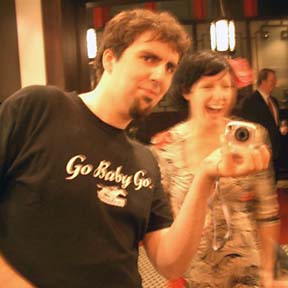 (Clearwisdom.net)
CHENGDU, Sichuan Province -- A strained and, to my ears, caterwauling Cantonese
chorus of "We Shall Overcome" boomed out across the somber, black-clad,
umbrella-clutching multitudes in Victoria Park in Hong Kong last Tuesday. I
clung to it as a shred of familiarity as I stood sweating, unable to move.
(Clearwisdom.net)
CHENGDU, Sichuan Province -- A strained and, to my ears, caterwauling Cantonese
chorus of "We Shall Overcome" boomed out across the somber, black-clad,
umbrella-clutching multitudes in Victoria Park in Hong Kong last Tuesday. I
clung to it as a shred of familiarity as I stood sweating, unable to move.
"Tomorrow, don't go down there," my friend Cindy, a native to this uber-capitalist city state of 7.3 million, had said Monday night, pointing toward the western end of Hong Kong island. The multi-hued lights glistened off the wake-churned harbor, in Willie Nelson's words, "like 10 million jewels in the sky."
"Why not?" I asked. We were at dinner in a restaurant on the Peak, the highest point on the island, with an incomparable view of the entire city.
"There's going to be a protest down there, tens of thousands of people," she said, "Article 23, you know what I'm talking about?"
I'd actually been reading about it in the local papers ever since I'd arrived in the city.
Article 23 is sort of the local version of the Patriot Act. It's a "national security measure" pushed by the central government in Beijing to help fight domestic "terrorism."
As a "Special Administrative Region" of China, Hong Kong was promised 50 years of the freedoms it enjoyed under 99 years of benignly oligarchic British rule when it was handed back over to China on the midnight of June 30, 1997. These freedoms include freedom of speech, press and assembly as well as freedom from unlawful search and seizures.
But the new law would allow police raids without a warrant as well as ban any groups that Beijing concluded were threats to national security. This is the same government, mind you, that brought you the Tiananmen Square massacre of 1989, and recently banned the Falun Gong movement, not to mention killing more than 50 of the group's imprisoned leaders.
These things have been par for course in post-9/11 representative democracies these days, but in Hong Kong, where all of the meaningful political leaders are appointed by the architects of the sprawling socialist state just over the border, the whole thing seems a bit more sinister. After all, in theory, in the United States, if we don't like the alterations to our basic rights that our government has made on our behalf, we can just kick the leaders out in the next election cycle.
There is no similar option in Hong Kong, so they have to make their feelings known in the street. Most of the people I talked to said that they felt they had to fight for their freedoms now, on the "give 'em an inch and they'll take a mile" premise, or eventually they'd have nothing left.
I had to see it for myself.
"That's just the kind of thing I'm traveling to see," I told Cindy.
So the next day, an unseasonably warm one even for semitropical Hong Kong, I made my way down the mountain from my hostel home and into the city to the huge park. It sits just west of the city center, on the ocean, surrounded by 50-story high-rise apartments framed by the jungle slopes that dominate the center of the island.
At first it seemed like nothing was going to happen. I walked the park, stopped to listen to an impassioned speech in Cantonese delivered by an white-bearded man surrounded by a sea of umbrellas.
And then, the march arrived.
It had started at the old city hall, maybe a kilometer away. A huge solemn thing, broken by the occasional shrill chant, it broke upon the park like a dark tidal sea, sweeping in through every conceivable entrance toward the large open field at the park's center.
With the heat, the smell, bodies packed so tight I couldn't move, and waves of speeches and songs breaking over us, I began to feel I was drowning in what was a largely incomprehensible political fervor. It was frightening.
Eventually, I ran out of water in my backpack Nalgene bottle and fought my way free, emotionally and physically exhausted by the heat.

The next day the front page of Hong Kong's South China Morning Post had a full color picture of the crowd and a banner headline proclaiming "500,000 March in Protest." A full-color magazine featuring pictures of the day's events hit the streets almost immediately. But strangely, or perhaps predictably, there was no mention of the massive event in China's mainland press.
"Article 23 Good for Hong Kong," the China Daily proclaimed, quoting a Communist Party official in a style that reminded me of how the U.S. media treats the dubious pronouncements of the Bush administration.
Several days later, in Chengdu, I watched a television account of the day's events, which had been timed to coincide with the sixth anniversary of Hong Kong's return to China. The cameras blindly followed the actions of smiling officials at the staged commemoration where the march started, when in front of them, behind the cameras, unmentioned crowds of placard-waving protesters went unseen.
http://www.northcoastjournal.com/071003/news0710.html#anchor685658
Category: Falun Dafa in the Media





